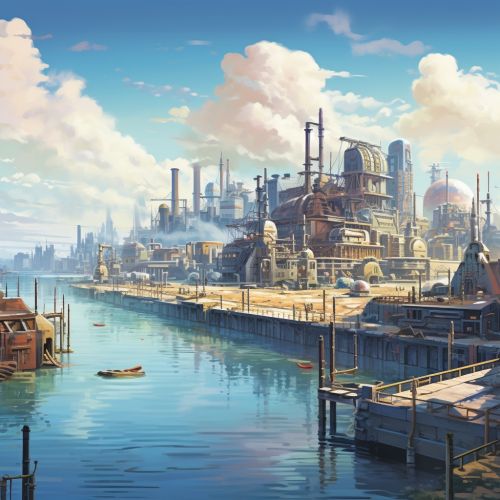Industrial water use
Overview
Industrial water use refers to the utilization of water in industries for various purposes, including cooling, processing, cleaning, and transportation of materials. The type and amount of water used can vary significantly depending on the industry, the specific processes involved, and the geographical location of the industry.


Types of Industrial Water Use
There are several types of industrial water use, each with its own unique requirements and impacts on the environment. These include:
- Cooling water: This is used in industries to cool machinery and processes. It is typically circulated through a cooling system and then discharged back into the environment, often at a higher temperature.
- Process water: This is used in the actual manufacturing or processing of goods. It can be used in a variety of ways, including as a solvent, in chemical reactions, or for cleaning and rinsing.
- Boiler water: This is used in boilers to generate steam, which can then be used for heating or power generation.
- Sanitation water: This is used for cleaning and sanitation purposes within the industry. It can include water used for washing equipment, flushing toilets, and other sanitation needs.
Water Sources
Industries can obtain water from a variety of sources, including surface water (such as rivers, lakes, and reservoirs), groundwater, and municipal water supplies. In some cases, industries may also use recycled water or desalinated water. The choice of water source can have significant implications for the environment and for the cost of water use.
Water Treatment
Before water can be used in industry, it often needs to be treated to remove impurities and to ensure it meets the necessary quality standards. This can involve a range of treatment processes, including filtration, sedimentation, disinfection, and chemical treatment. After use, the water may also need to be treated before it can be discharged back into the environment.
Impacts of Industrial Water Use
Industrial water use can have a range of impacts on the environment and on human health. These can include:
- Water pollution: Industries can release a range of pollutants into the water, including chemicals, heavy metals, and thermal pollution (from heated water discharges).
- Water scarcity: In areas where water is scarce, industrial water use can contribute to water shortages and conflicts over water resources.
- Habitat destruction: The extraction of water for industrial use can lead to the destruction of aquatic habitats and the loss of biodiversity.
Strategies for Reducing Industrial Water Use
There are a range of strategies that industries can use to reduce their water use and to minimize their impacts on the environment. These can include:
- Water recycling: This involves treating and reusing water within the industry, rather than discharging it into the environment.
- Water efficiency: This involves using water more efficiently, for example by improving processes, using more efficient equipment, or reducing leaks.
- Water stewardship: This involves taking responsibility for the impacts of water use and working to improve water management practices.
